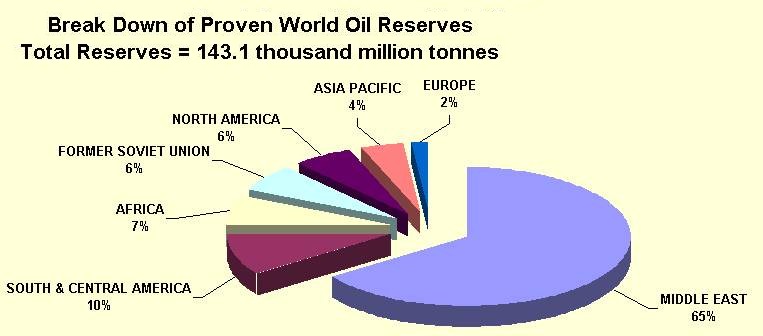
One of the major drivers towards the development of biofuels is the simple fact that oil reserves are finite. What follows is a brief statistical quantification of the actual Worldwide and UK proven oil reserves, oil production and oil consumption.
All figures are sources from reference 4. ref4
Worldwide Reserves
Proven Worldwide Reserves
At the end of 2001, the total proven world oil reserve was 143.1 thousand million tonnes.

Worldwide Oil Consumption
Worldwide consumption of oil between 1991 and 2001 has increased by 12% from 3137.6 to 3510.6 million tonnes of oil.
Based on total worldwide proven oil reserves of 143.1 thousand million tonnes of oil (end 2001) and a worldwide oil
consumption rate of 3510.6 million tonnes then we can roughly estimate that at present oil consumption rates then the
World has 40.8 Years worth of oil reserves left which could possibly last until 2044.
These figures do not include any further oil fields or regions that have so far been unexplored or not fully exploited
and therefore maybe slightly on the pessimistic side.
Worldwide Oil Production
Worldwide production of oil from 1991 to 2001 has increased by 13.6% from 3155.5 to 3584.9 million tonnes of oil per Year
and led to a surplus of 74.3 million tonnes of oil in 2001.
 |
| A north sea platform pumps away, but for how long? |
Based on the United Kingdom’s proven oil reserves of 0.7 thousand million tonnes of oil and a UK consumption of 76.1 million tonnes of oil per Year, then the UK will become a net importer of oil within approximatly nine years from 2001, i.e. by 2010.
The Department of Trade and Industry has published figures for proven reserves plus probable reserves of oil for the UK as being about 1,010 million tonnes of oil (end 2000). Based on these figures the Uk has untill around 2013 before becoming a net importer.With the mandatory adding of biodiesel to DERV fuel then the life of the UK’s oil reserves would be extended and further oil exploration (costly in terms of environmental damage) and greater reliance on oil imports would be delayed. By introducing a biodiesel blend of 2% and then increasing this over ten years to say 10% biodiesel, Then within this times a years worth of road transport oil would be saved.